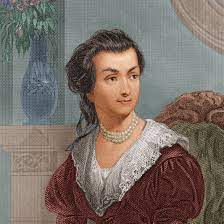Genesis 1:27 “So God created man in his own image, in the image of God created he him; male and female created he them.”
Malachi 2:10 “Have we not all one father? hath not one God created us? why do we deal treacherously every man against his brother, by profaning the covenant of our fathers?”
John 3:16 “For God so loved the world, that he gave his only begotten Son, that whosoever believeth in him should not perish, but have everlasting life.”
Galatians 3:28 “There is neither Jew nor Greek, there is neither bond nor free, there is neither male nor female: for ye are all one in Christ Jesus.”
James, a young black man, was a friend of John and Abigail Adams. He was a paid worker for this family, and was loved, cared for, and educated by them. In a letter from February 13, 1797, Abigail described a confrontation that resulted from her decision to send James to school upon his request:
“James desired that he might go. I told him to go with my compliments to Master Heath and ask him if he would take him. He did and Master Heath returned for answer that he would. Accordingly James went. After about a week, Neighbour Faxon came in one Evening and requested to speak to me. His errand was to inform me that if James went to School, it would break up the School for the other Lads refused to go.”
As a result, Abigail railed against this obvious injustice:
“This Mr. Faxon is attacking the principle of Liberty and equality upon the only Ground upon which it ought to be supported, an equality of Rights. The Boy is a Freeman as much as any of the young Men, and merely because his Face is Black, is he to be denied instruction? How is he to be qualified to procure a livelihood? Is this the Christian Principle of doing to others, as we would have others do to us?”
In a stunning punctuation of her argument that reminded others of their Christian obligations, Abigail went on to sternly remind Mr. Faxon and the young men he represented that “I hope we shall all go to Heaven together.”
Mr. Faxon, swayed by her passionate, Bible-based arguments left to carry the message to the Lads whose perspectives were skewed by discrimination. The result from Abigail’s perspective: James has since attended school for some time and “I have not heard any more upon the subject.”
“Woke” is a modern term-of-art for being alert to injustice and racism. Frankly, an honest and respectful discussion about lingering racial inequality in our society would be healthy and productive. Yet, it is important to realize that these discussions are not new as a part of our American experiment, and our current Christian perspective should be modeled on the words of this Founding Mother and her Biblical worldview.
“Love thy neighbor as thyself,” “God created man in his own image,” “Have we not all one Father,” “For God so loved the world,” “ye are all one in Christ Jesus.” These thoughts were undoubtedly flooding through the mind of Abigail Adams as she rebuked racism in her day. These same thoughts should dominate our thinking today as we strive to mend and heal a society filled with strife and adversity. They also provide an historical example of justice that should make us proud of our founders, and that discounts the current narrative about the ubiquitous, inherent evils of America’s origin.
PLEASE PRAY FOR THE HEALING OF AMERICA WHILE EMBRACING A BIBLE-BASED VIEW OF EQUALITY AND JUSTICE. In 1797, Abigail Adams made a bold stand for equality and justice. May her example provide a model of true wokeness in Christian America today that elevates healing and justice instead of strife as we mold our society to ensure an Equality of Rights for all people.



